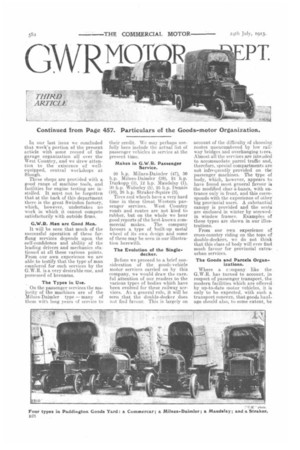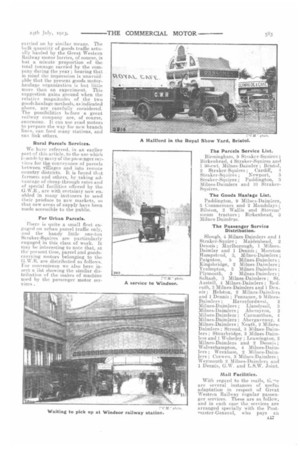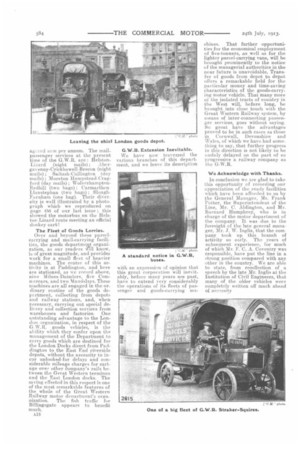Continued from Page 457. Particulars of the Goods – motor Organization.
Page 68

Page 69

Page 70

If you've noticed an error in this article please click here to report it so we can fix it.
in our last issue we concluded that week's portion of the present article with some record of the garage organization all over the West Country, and we drew attention to the existence of wellequipped, central workshops at Slough.
These shops are provided with a good range of machine tools, and facilities for engine testing are installed. It must not be forgotten that at the back of this department there is the great Swindon factory, which, however, undertakes no work in which it cannot compete satisfactorily with outside firms.
G,W.R. Men are Good Men.
It will be seen that much of the successful operation of these farflung services depends upon the self-confidence and ability of the leading drivers and mechanics stationed at all these various points. From our own experience we are able to testify that the type of man employed for such services by the G.W.R. is a very desirable one, and possessed of keenness.
The Types in Use.
• On the passenger services the ma
jority of the machines are of the Milnes-Daimler type —many of them with long years of service to
their credit. We may perhaps usefully here include the actual list of passenger vehicles in service at the present time.
Makes in G.W.R. Passenger Service.
20 h.p. MiInes-Daimler (47), 30 lnes-Daimler (39), 24 h.p. Durkopp (3), 12 h.p. Maudslay (1), 30 h.p. Wolseley (5), 25 h.p. Deis (10), 28 h.p. Straker-Squire (3).
Tires and wheels have a very hard time in these Great Western passenger services. West Country roads and routes are not kind to rubber, but on the whole we hear good reports of the best-known commercial makes. The company favours a type of built-up metal wheel of its own design and some of these may be seen in our illustration herewith.
The Evolution of the Singledecker.
Before we, proceed to a brief consideration of the goods-vehicle motor services carried on by this company, we would draw the careful attention of our readers to the various types of bodies which have been evolved for these railway services. As a general rule, it will be seen that the double-decker does not find favour. This is largely on
account of the difficulty of choosing routes unencumbered by low railway bridges and overhanging tiees. Almost all the services are intended to accommodate parcel traffic and, therefore, special compartments are not infrequently provided on the passenger machines. The type of body, which, however, appears to have found most general favour is the modified char-à-banes, with entrance only in front, and this corresponds with the experience of other big provincial users. A substantial canopy is provided and the scatr. are enclosed in winter by screwedin window frames. Examples of these types are shown in our illustrations.
From our own experience of cross-country riding on the tops of double-deckers, we do not think that this class of body will ever find much favour for provincial extra, urban services.
The Goods and Parcels Organizations.
Where a ceinpany like the G.W-R. has turned to account, in respect of passenger transport, the modern facilities which are offered by up-to-date motor vehicles, it is only to be expected, with such a transport concern, that goods haul. age should also, to some extent, be carried on by similar means. The bulk quantity of goods traffic actually hauled by the. Great Western Railway motor lorries, of course, is hut a mimite proportion of the total tonnage carried by the company during the year ; bearing that in mind the impression is unavoidable that the present; goods motorhaulage organization is but littie more than an experiment. This suggestion gains ground when the relative magnitudes of the two goods haulage methods, as indicated above, are carefully considered. The possibilities hr fore a great railway company are, of course, enormous. It can use road motors to prepare the way for new branch lines, can feed many stations, and can link others.
Rural Parcels Services.
We have referred, in an earlier part of this article, to the use which f, made by many of the passtnger services for the conveyance of parcels between villages and into remote country districts. It is found that farmers and others, by taking advantage of cheap through rates and of special facilities offered by the O. W.R., are with certainty now enabled in many instances to send their preduce to new markets, so that new areas of supply have been made accessible to the public.
For Urban Parcels.
There is quite a small fleet engaged on urban parcel traffic only, arid the handy little one-ton Straker-Squires are particularly engaged in this class of work. It may be interesting to note that, at the present time, parcel and goodscarrying motors belonging to the [LW:R. are distributed as follows. For convenience we also here insert a list showing the similar distaibution of the makes of machine used by the passenger motor services . rhe Parcels Service List. Birmingham, 9 Straker-Squires ; Birkenhead, 4 Straker-Squires and 1 30-cwt. Milnes-Daimler ; Bristol, 2 Straker-Squires ; Cardiff, Straker-Squires ; Newport, 3 Straker-Squires ; Paddington, 3 Milnes-Daimlers and 10 StrakerSquires. • The Goods Haatlege List.
Paddington, 9 Miliies-Daimiers, 5 Commerears and 2 Maudslays ; Bilston, 2 Wallis and Stevens' steam tractors ; Birkenhead, 3 Milnes -Daimlers.
The Passenger Service Distribution.
Slough, 4 Milnes-Dainders and 1 Straker-Squire ; Maidenhead, 2 Dennis ; Marlborough, 1 MinesDaimler and 1 Dennis ; Moreton Hampstead, 3, Milnes-Daimlers ;
Paignton, 5 MiInes-Daimler s ; Kingsbridge, 2 Milnes-Daimlers ; Yealmpton, 3 Midnes-Daimlers ; Plymouth, 3 Milnes-Daimlers ; Saltash, 3 Milnee-Dairiders ; St. Austell, 4 Milnes-Dainders ; Redrah, 3 Milnes-Daimlers and 1 Dennis ; Helston, 2 .Milnes-Daimlers and 1 Dennis ; Penzance, 9 Milnes Daimlers ; Haverfordwest„ 2 Milnes-Daimlers ; Llandyssil, 3 Milnes-Daimlers ; Abe rayron , 2 Milnes-Daimlers ; Carmarthen, 4 Milnes-Daimlers ; Aberga,venny, 4 Milnes-Daimlers ; Neath, 2 MimesDaimlers; Stroud, 3 Milnes-Daimlers ; Stourbridge, 3 Milnes-Dairnlers and 1 Wolseley ; Leamington, 2 Milnes-Daimlers and 2 Dennis ; Wolverhampton, 4 Milnes-Daimlers ; Wrexham, 2 litlilnes-Daimlers ; Corwen. :3 Milnes-Daimlers ; Weymouth 2 Milnes-Daimlers and 1 Dennis, O.W. and L.S.W. Joint.
Mail Facilities.
With regard to the mails, tI.7-e are several instances of usefui adaptation in respect of Great Western Railway regular passenger services. These are as follow, and in each case the services are arranged specially with the Postmaster-General, who pays an
ag red SU ill per annum. The mailpassenger services at the present time of the G.W.R. are : HelstonLizard (night mails) ; gavenny-Crickhowell-Brecon (night mails); Saltash-Callington (day mails); Moreton Hampstead-Cragford (day mails) ; WolverhamptonRedhill (two bags) ; CarmarthenLlanstephan (two bags); SloughFarnham (one bag). Their diversity is well illustrated by a photograph which we reproduced on page 456 of Our last issue ; this showed the motorbus on the Helston-Lizard route meeting an official donkey cart 1 The Fleet of Goods Lorries.
Over and beyond these parcelcarrying and mail-carrying facilities, the goods clepartme,nt organization, as our readers \fill know, is of great magnitude, and provides work for a. small fleet of heavier machines. The eentre of this activity is at. Paddington, and here are stationed, as we record above, nine Milnes-Daimlers, five Corninert:ars, and two Mandslays. These machines .are all engaged in the ordinary routine of the goods department, collecting from depots and railway stations, and, when necessary. carrying out special delivery and collection services from warehouses and factories. One outstanding advantage to the London organization, in respect of the G.W.R. goods vehicles, is the ability which they confer upon the management of the Department to carry goods which are destined for the London Docks direct from Paddington to the East End riverside depots, without the necessity to incur unlooked-for delays and considerable mileage charges for cartage over other Company's rails between the Great Western terminus and the East London clocks. The saving effected in this respect is one of the most remarkable features of the whole of the Great Western Railway motor denartnientis orga, nization. The fish traffic for Billingsgate appears to benefit rimeh.
G.W.R. Extension Inevitable.
We have now traversed the various branches of this department, and we leave its description with an expression of opinion that this great corporation will inevitably, before many years are past, have to extend very considerably the operations of its fleets of passenger and goods-carrying ma chines. That further opportunities for the economical employment of five-tonners, as well as for the lighter parcel-carrying vans, will be brought prominently to the notice of the managerial authorities in the near future is unavoidable. Transfer of goods from depot to depot offers a remarkable field for the particular money and time-saving characteristics of the goods-carrying motor vehicle. That many more of the isolated tracts of country in the West will, before long, be brought into close touch with the Great Western Railway system, by means of inter-connecting passenger services, goes without saying. So great have the advantages proved to be in such cases as those in Cornwall, Devonshire and Wales, of which we have had something to say, that further progress in this direction is not likely to he unduly delayed on the part of so progressive a railway company as the GeW,R.
We Acknowledge with Thanks.
In conclusion we are glad to take this opportunity of recording our appreciation of the ready facilities which have been afforded to us by the General Manager, Mr. Frank Potter, the Superintendent of the Line, Mr. C. Aldington, and Mr. Barnard Humphrey, who is in charge of the motor department of the company. It was due to the foresight of the late general manager, Mr. J. W. Inglis, that the corn pany took up this branch of activity so early. The years of subsequent experience, for much of which Mr. F. C. A. Coventry was responsible, have put the line in a strong position compared with any other in the country. We are able to state, from recollection or a speech by the late sir. Inglis at the Institution of Civil Engineers, that many of the older vehicles were completely written off much ahead of nes_teasity








































































